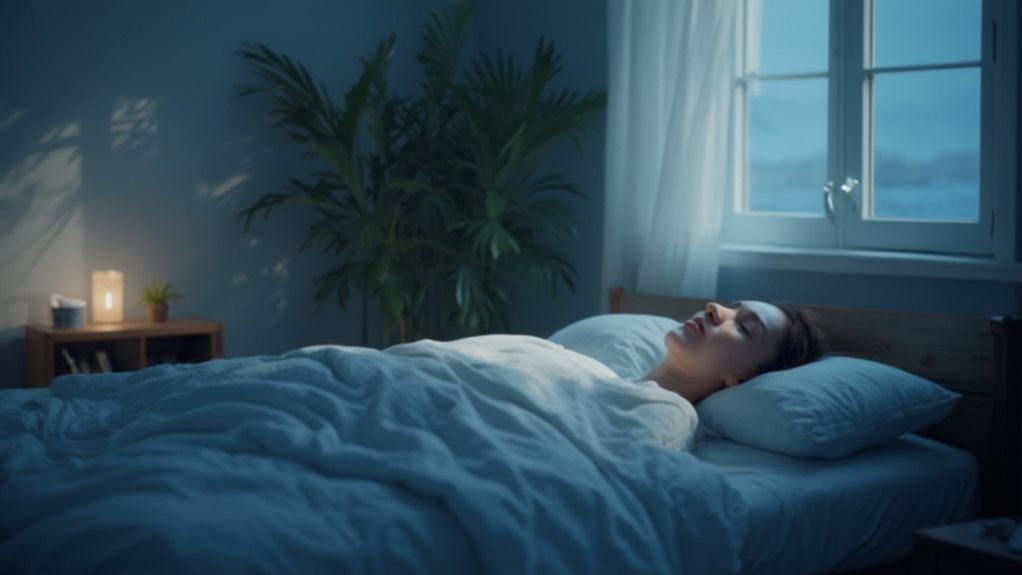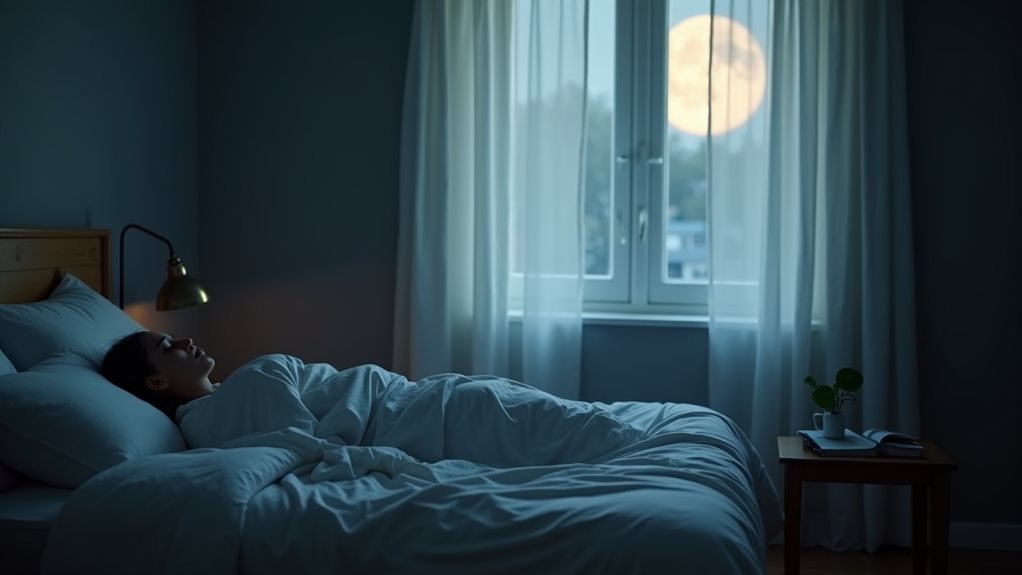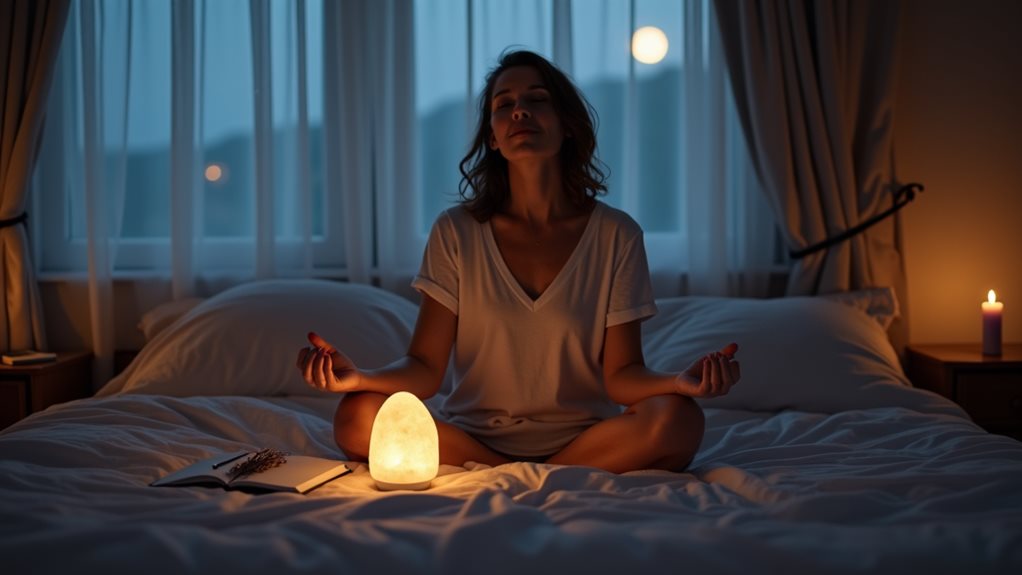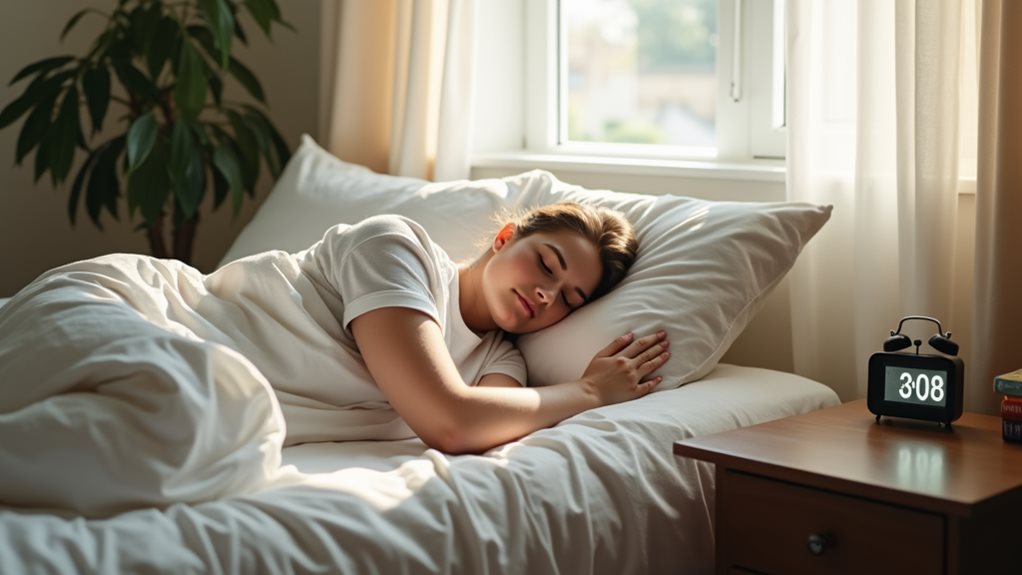
You can leave behind sleeping pills and naturally transform your sleep with self-hypnosis. This safe technique enhances sleep quality by calming your mind and body through deep breathing, progressive relaxation, and sleep affirmations. Not only does it help you manage stress, but it also improves your overall well-being, giving you control over your sleep patterns without any side effects. Explore how self-hypnosis integrates into your nightly routine and witness significant changes in how you rest.
Key Takeaways
- Self-hypnosis is a natural alternative to sleeping pills, avoiding dependency and side effects.
- Techniques like deep breathing and progressive relaxation promote natural sleep onset and maintenance.
- Regular practice of self-hypnosis can significantly improve sleep quality and duration.
- Incorporating sleep affirmations and calming imagery enhances mental relaxation, aiding quicker sleep.
- Self-hypnosis empowers individuals to control sleep patterns and reduce stress without medication.
The Science Behind Insomnia and How Self-Hypnosis Can Help
Understanding the science behind insomnia is vital as it affects countless individuals who struggle with falling asleep, staying asleep, or waking up too early.
Insomnia isn't just about feeling tired. It's a complex disorder where your sleep architecture gets disrupted, which means the typical stages of sleep don't occur in harmony.
Identifying insomnia triggers is essential. These can range from stress and anxiety to poor sleep hygiene or even underlying health issues.
Recognizing and addressing these triggers can greatly improve your sleep quality.
You're not alone in this, and understanding these aspects is the first step toward better sleep.
Key Benefits of Self-Hypnosis for Enhancing Sleep Quality
While you may feel overwhelmed by restless nights, embracing self-hypnosis can greatly enhance your sleep quality. This natural relaxation technique allows you to explore mindfulness meditation, fostering a calm mind conducive to deep sleep.
When you integrate self-hypnosis into your sleep hygiene routine, you're taking a powerful step towards controlling your sleep without medication. You'll find yourself not just sleeping longer, but more deeply.
This transformation in your sleep experience can rejuvenate your mind and body, reducing stress and enhancing overall well-being. It's a sustainable, effective method to improve your sleep quality and wake up refreshed.
Essential Self-Hypnosis Techniques for Better Sleep

To effectively harness the power of self-hypnosis for better sleep, it is essential to master a few key techniques that promote deep relaxation. Here's how you can start:
| Technique | Description | Benefit |
|---|---|---|
| Deep Breathing | Inhale deeply, hold, exhale slowly. | Calms the mind, body. |
| Progressive Relaxation | Tense and relax each muscle group. | Reduces physical tension. |
| Sleep Affirmations | Repeat calming phrases to yourself. | Sets a positive mindset. |
These relaxation techniques create a serene bedtime atmosphere, helping you drift into a peaceful sleep. Keep practicing, and you'll feel the transformation.
The Mechanism: How Self-Hypnosis Aids in Sleep Improvement
As you explore self-hypnosis, you'll discover its potent ability to enhance your sleep. This method taps into your subconscious, setting off sleep triggers and promoting mental relaxation.
It's about reprogramming your mind to shift smoothly into sleep. By focusing on calming imagery and soothing affirmations, you align your mental state with relaxation and sleep-readiness.
This mental shift is vital because it naturally eases you into a restful night without the crutch of medication. You're fundamentally training your brain to initiate sleep effortlessly and maintain it throughout the night, ensuring you wake up refreshed and rejuvenated.
Integrating Self-Hypnosis Into Your Nightly Routine

Integrating self-hypnosis into your nightly routine can transform your approach to sleep, making bedtime a gateway to tranquility rather than a struggle.
Begin by setting a consistent bedtime and incorporating relaxation techniques like deep breathing or progressive muscle relaxation into your nightly rituals.
As you lie down, guide yourself through positive affirmations, envisioning calm and restfulness. This practice not only eases you into sleep but also reinforces a peaceful mindset.
Over time, these steps become a comforting ritual, naturally leading to deeper, more rejuvenating sleep.
Comparing Self-Hypnosis With Traditional Sleeping Medications
Many people struggle with sleep issues and often turn to traditional sleeping medications for relief. However, you might've noticed the drawbacks of sleeping pills, such as dependency and side effects.
In contrast, self-hypnosis offers a natural and empowering alternative. The benefits of self-hypnosis include reducing stress, enhancing sleep quality, and fostering a sense of control over your sleep without the risks associated with pills.
Proven Outcomes: How Regular Self-Hypnosis Improves Sleep

When you commit to regular self-hypnosis, you'll likely notice a significant improvement in your sleep quality.
This practice taps into powerful relaxation techniques that help recalibrate your sleep patterns. By focusing on calming your mind before bed, you'll find yourself slipping into a deeper, more restorative sleep more easily.
It's not just about getting more sleep, but enhancing the quality of your rest. You'll wake up feeling rejuvenated and ready to tackle the day.
Frequently Asked Questions
How Long Does It Take to See Results From Self-Hypnosis?
You'll typically notice improvements in your sleep within a few weeks of practicing self-hypnosis techniques. The effectiveness timeline varies, but consistent use enhances the benefits and helps maintain them long-term.
Can Self-Hypnosis Help With Sleep Issues Other Than Insomnia?
Yes, self-hypnosis can aid with various sleep issues beyond insomnia, such as stress reduction and anxiety relief, helping you relax deeply and improve overall sleep quality. It's a supportive, natural way to enhance rest.
Are There Any Age Restrictions for Practicing Self-Hypnosis?
You'll find self-hypnosis benefits at any age, as there are no age restrictions for its practice. It's a supportive, natural method to improve sleep, suitable for both young and older individuals seeking better rest.
How Do I Know if I Am Doing Self-Hypnosis Correctly?
To evaluate your progress with self-hypnosis techniques, notice if you're feeling more relaxed and sleeping better. Regular practice should lead to improved sleep quality and a greater sense of calm before bedtime.
What Should I Do if Self-Hypnosis Doesn't Work for Me?
If self-hypnosis isn't cutting it for you, don't put all your eggs in one basket. Explore alternative therapies and seek professional guidance to tailor a solution that fits your unique sleep needs.
Conclusion
You're not alone in your quest for better sleep. Studies show that 90% of individuals who practice self-hypnosis experience improved sleep quality. By integrating these techniques into your nightly routine, you can enjoy deeper, more restorative sleep without relying on medications. Remember, your mind is powerful, and with self-hypnosis, you're harnessing that power to transform your nights. Start tonight, and wake up feeling more refreshed and empowered tomorrow. You've got this!





